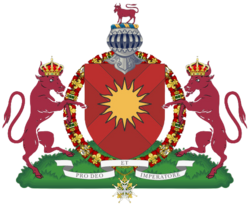MNU v. Makko Oko: Difference between revisions
mNo edit summary |
No edit summary |
||
| Line 38: | Line 38: | ||
==Opinions== | ==Opinions== | ||
Chief Justice Edgar Gerlach had voted to strike down the AoU, stating that it violated the "core structure of government": | |||
"The Act of Union was a good faith attempt to modernize the government whilst ignoring the current government in place. There is no concept of constitutional law in the Basic Rights, and there is nothing that suggests the Act of Union was supporting a unitary framework. This legislation went a bit too far in violating the ideals of unitarianism, and a softened version of this law may pass muster through this court." | |||
==Effects== | ==Effects== | ||
Immediately after the decision was released, Emperor [[Conall Solis]] issued a directive stipulating that the law was constitutional per the notwithstanding clause and was to be in full force. Additionally, the case led to the ratification of the 6th Amendment of the [[Constitution of Makko Oko]], which restricted the court's power of judicial review and also solidified and established the Act of Union and what it did in a way that made it constitutional while at the same time allowing it to be repealed in the future or changed without constitutional revision. | |||
==See Also== | ==See Also== | ||
Latest revision as of 05:05, 25 July 2024
| MNU v. Makko Oko | |
|---|---|
 | |
| Court | Supreme Court, Opposh, NT, Makko Oko |
| Decided | September 19, 2027 |
| Case history | |
| Appealed from | Appellate Court of Appeals of Makko Oko |
| Case opinions | |
| Majority | Gerlach, Reynolds |
| Dissent | Aponte, Sullivan |
MNU v. Makko Oko is a case that was decided by the Supreme Court of Makko Oko on September 19th, 2027 on the constitutionality of the Act of Union 2027 and the conversion of divisions into full provinces with more autonomy.
Background
The case began after the ratification of the Act of Union 2027 and the NCRU refused to sue, supporting the law and what it would cause, so the MNU was formed as a pro-nationalist version of the NCRU and sued the government to get the law stricken down.
Decision
The court ruled 2-2-2 against ideological lines, keeping the original ruling by the Appellate Court of Appeals saying it was unconstitutional.
Opinions
Chief Justice Edgar Gerlach had voted to strike down the AoU, stating that it violated the "core structure of government":
"The Act of Union was a good faith attempt to modernize the government whilst ignoring the current government in place. There is no concept of constitutional law in the Basic Rights, and there is nothing that suggests the Act of Union was supporting a unitary framework. This legislation went a bit too far in violating the ideals of unitarianism, and a softened version of this law may pass muster through this court."
Effects
Immediately after the decision was released, Emperor Conall Solis issued a directive stipulating that the law was constitutional per the notwithstanding clause and was to be in full force. Additionally, the case led to the ratification of the 6th Amendment of the Constitution of Makko Oko, which restricted the court's power of judicial review and also solidified and established the Act of Union and what it did in a way that made it constitutional while at the same time allowing it to be repealed in the future or changed without constitutional revision.
See Also
